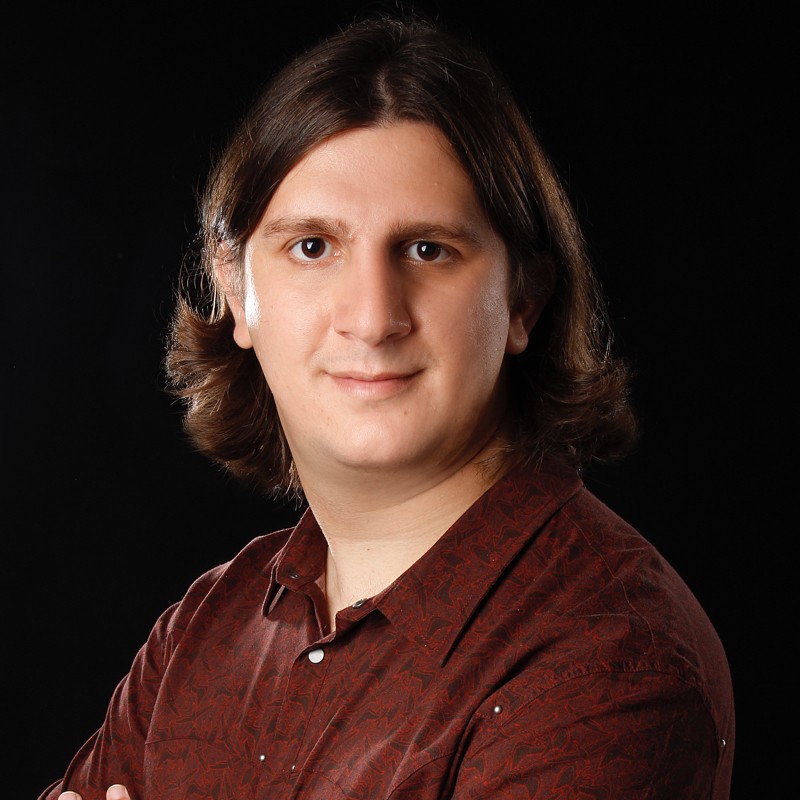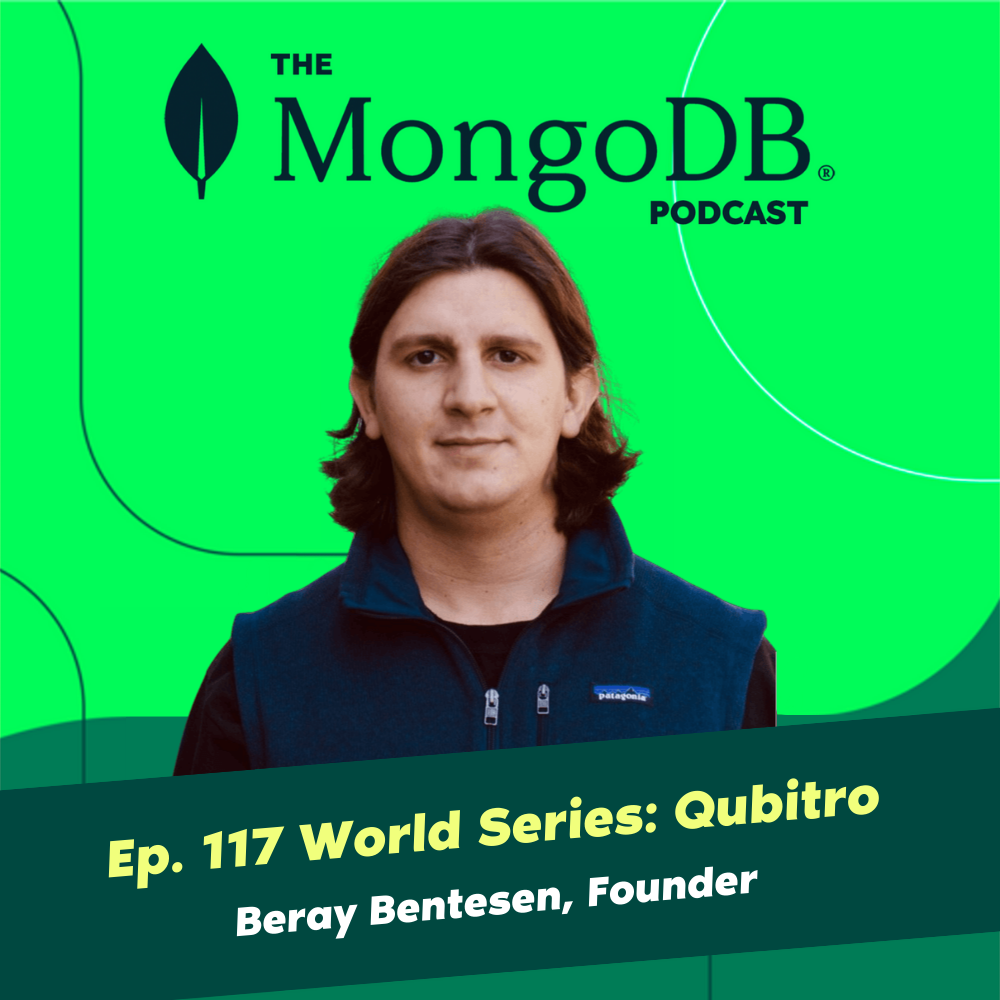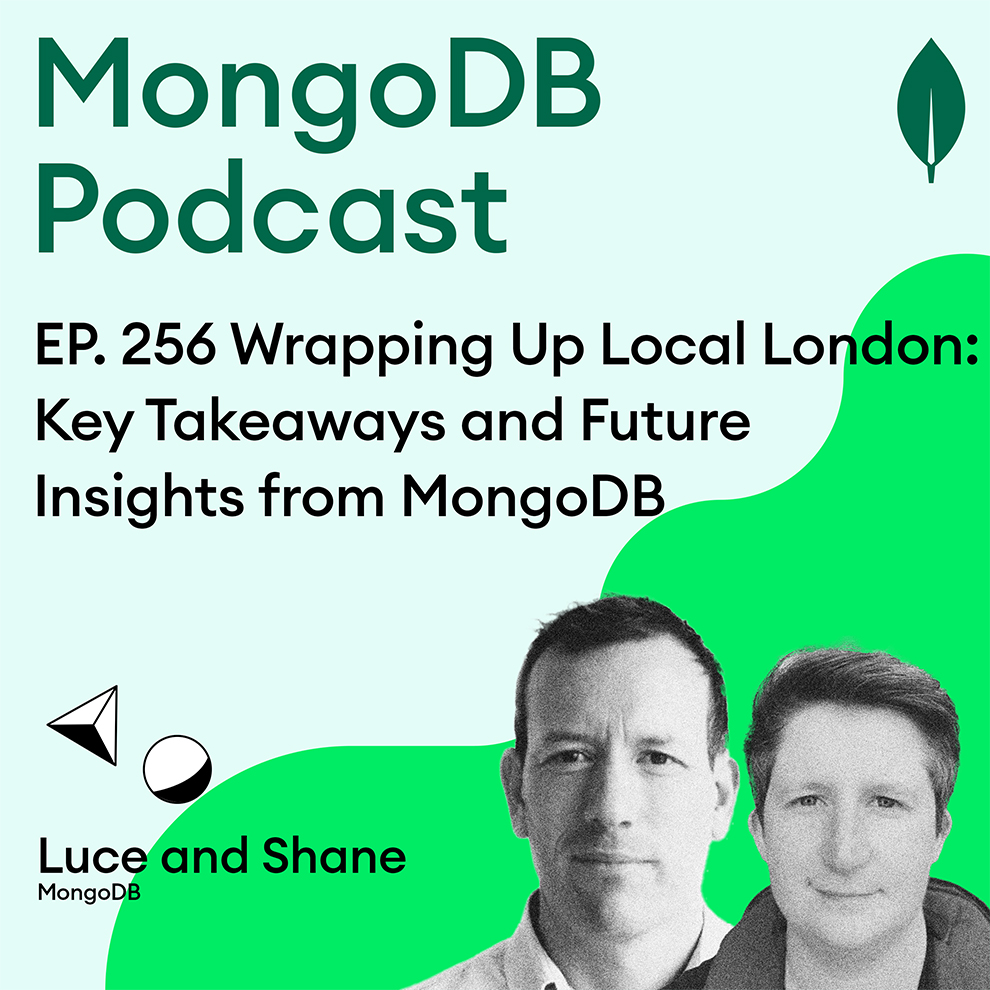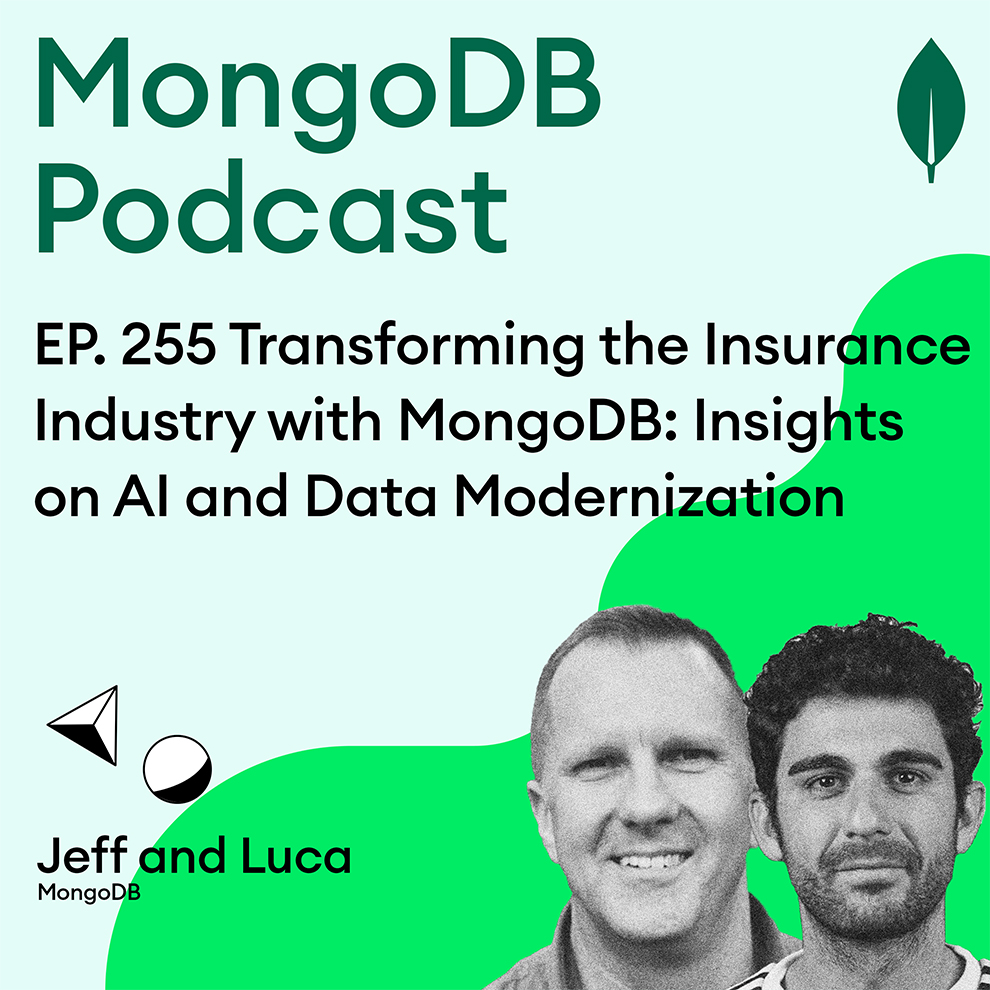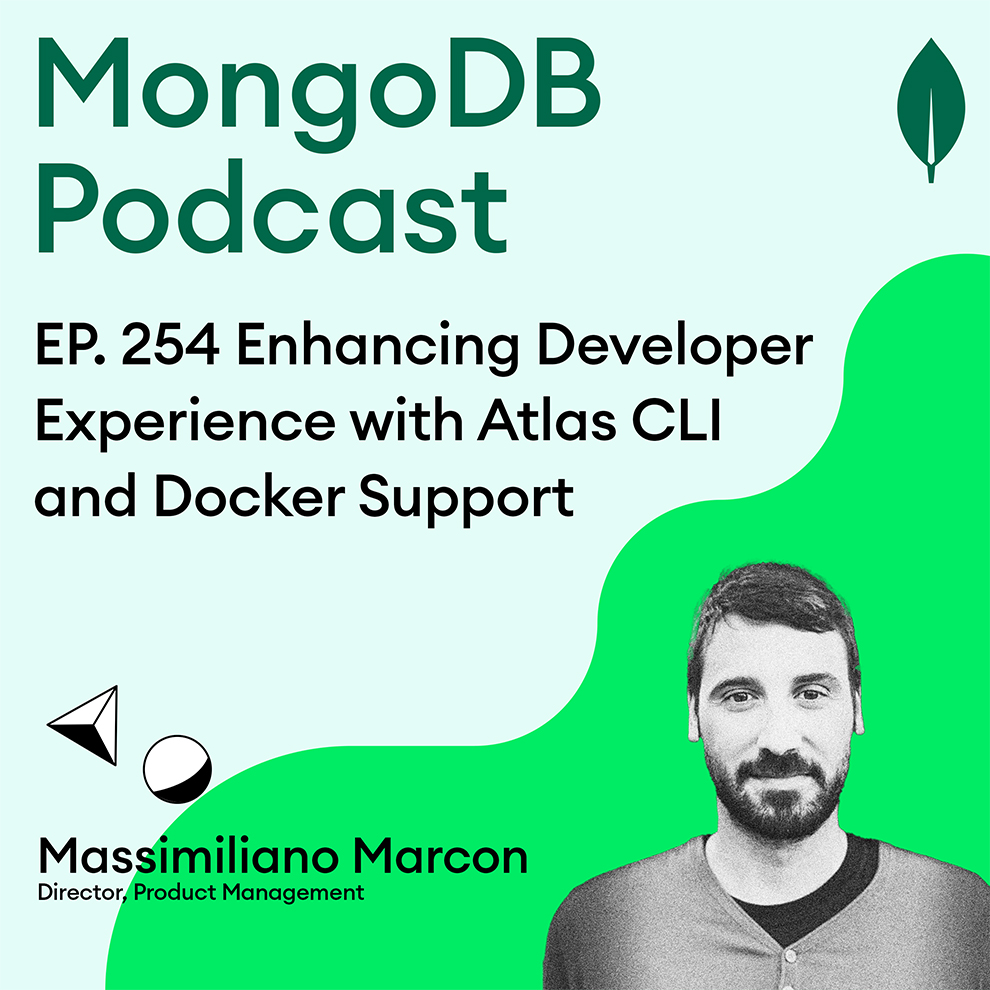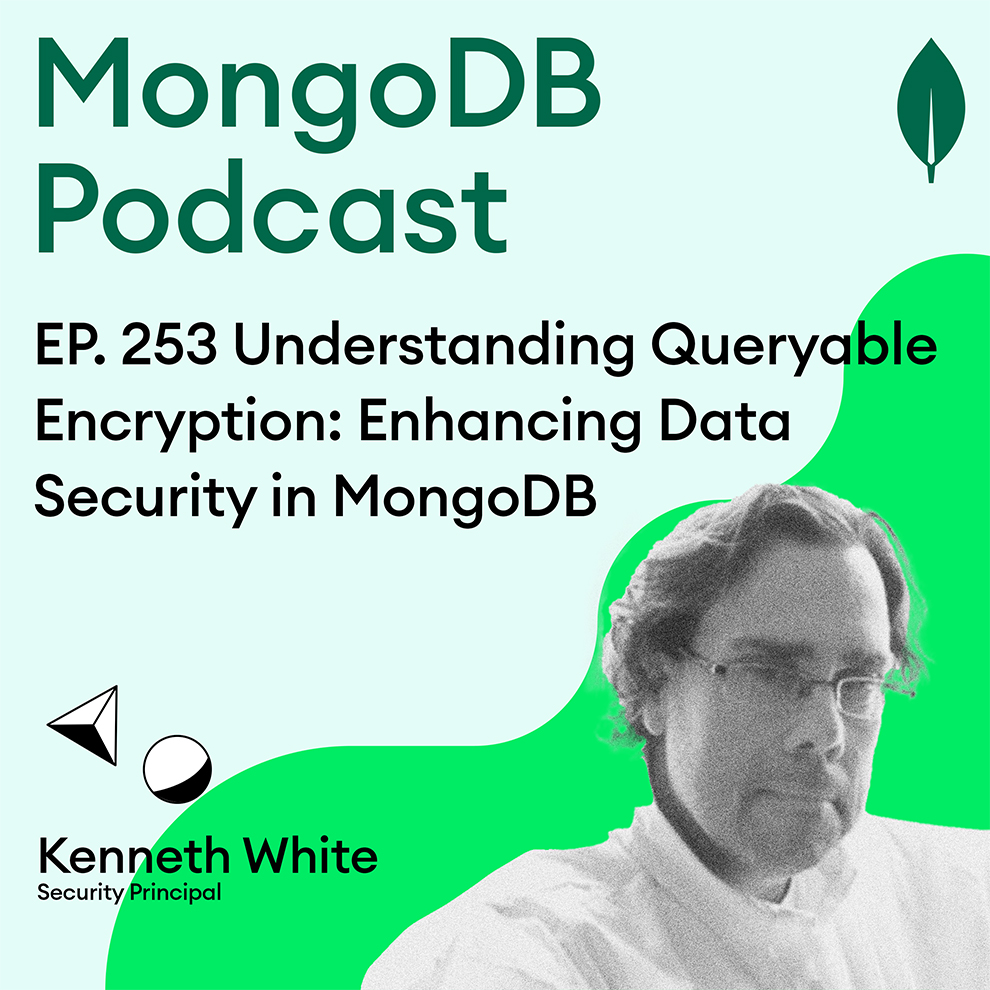Ep. 117 The MongoDB World Series - Beray Bentesen From Qubitro
- 0.5
- 1
- 1.25
- 1.5
- 1.75
- 2
Shane McAllister: Welcome once again to the podcast. We're certainly glad to have you join us here. I'm Shane McAllister. I am a Developer Advocate here at MongoDB and this is our world series of podcasts, so we have recorded a number of episodes on MongoDB world that happened in the second week of June, and we are sharing those episodes with you. This is episode two and anybody who's listened to the prior episode, would've also heard me introduce Cedric, who's our intern here at MongoDB this summer. Hey, Cedric, how are you?
Cedric: Hey, Shane. Dude, doing well, how are you?
Shane McAllister: Good. What's been keeping you busy this week. It's your third week or so, is it?
Cedric: Yeah. Third technical week now at MongoDB and it's kind of going by really fast, because I'm starting to dive into some cool projects. Of course, as the Developer Advocate Intern here for the summer in the US, of course. So many of you listening are probably familiar with the MongoDB developer Center at mongodb.com/ developer, which pretty recently got a huge revamp if I'm correct, right?
Shane McAllister: Yeah, it was pretty extensive. For us, it's our key kind of developer portal with all of our articles and our howtos and getting started in tutorials. We did a massive transformation on that, which came out there just over a month ago. And it's a really good destination for anybody looking to learn about MongoDB, learn about the products, see the kind of demos and tools that we are building for our developer community.
Cedric: Absolutely. Yeah. And they're letting me actually help create some content there. In the realm of maybe Kubernetes, maybe some JavaScript type of tutorials, code examples, anything in that realm, I'll probably be working on some content here soon, so keep an eye out and I'm really excited about that.
Shane McAllister: Okay. They're letting you loose on the developer center and you'll be a published author then, so Cedric, right?
Cedric: Oh gosh. Yeah. This is huge. Maybe a O'Reilly book is next up.
Shane McAllister: Maybe. Yeah. Set your sights high. Perfect. Well, look, this is episode two and we will get to the longer interview that was done at MongoDB World shortly. But Cedric, I know that you were roaming the exhibition floor. I saw you with a microphone and I know that you managed to doorstep, I suppose some of the attendees and get their opinions. How did that go?
Cedric: Oh dude. It was fantastic. There was two interviews that we'll bring on to the show here in a second. One was a student kind of like myself with a startup idea, so he was looking into MongoDB University and one was a fascinating dude who was focused on sustainability solutions. Both of them were great conversations that were done, I think on the second day, during the conference at MongoDB World, so let's go and hear from a few of them right now. Hey, my name's Cedric Claborn, I'm here with...
Nigel: Nigel, a student here at MongoDB.
Cedric: Hey. And today we're talking about anything cool that you've experienced at MongoDB or anything you're looking forward to.
Nigel: Yeah. I just got off the little Ask the Expert Section and I was talking about kind of my first actual startup idea I wanted to make. It was really cool. I met an awesome engineer named Nate, who was helping with me and I'm ready to sign up for the MongoDB University courses and just get started, man. I'm real excited.
Cedric: Well, hey, happy to hear that. Thank you so much. Hey, how's it going? My name's Cedric Claborn. I'm here with...
Mario: Mario Eldon. How are you Cedric?
Cedric: Hey, doing good. I just wanted to ask you real quick. What's been your biggest takeaway at MongoDB World or anything that you've really enjoyed?
Mario: Yeah. Well, one thing, well this is day two. First of all, the Java Center is beautiful and you guys did a really good job architecting the floors, that's first and foremost. One thing that really stuck out yesterday was a workshop about sustainability and the context of technology and architecture and tech stack, et cetera. That's something that has not been really talked about and to further prove that whenever I asked anyone in the room, whether it's on the third floor, fourth floor, fifth floor, whether they work for Mongo or not, about sustainability in the context of technology, they're like," Ah?" That's a red flag, first of all. But it's something that because of the replies that I've been getting and the reactions, it makes me want to indulge it in it more, because going green in the context of technology, something that there aren't many solutions for yet. And if there are, people aren't very aware of it. That is one thing that I am taking back to CVS as soon as I get back and I'm going to try to take that and make it into an initiative and try to integrate it into our CVS ecosystem for our application.
Cedric: Absolutely. Well, that's very inspiring to hear. Thank you for sharing man.
Mario: You got it.
Shane McAllister: Wow. They were great. It was really good to hear that captured on the show floor and all the noises, et cetera, from the show behind as well too, so fair play Cedric. Is there going to be some more?
Cedric: Yes. In the next episode, we'll bring out some more customers, some MongoDB employees, there's a lot to come, so stay tuned.
Shane McAllister: Great. We very much look forward to that. This is a nine part series recorded at MongoDB World. And again, it consists of an interview between Mike Lynn and a really interesting company called Qubitro from the show floor at MongoDB World. So Beray Bentesen is the founder and CEO of Qubitro and Qubitro is a device data platform for modern applications, particularly in the IoT space. So it taking sensor data and essentially any network capable device, and brings all that data back into a single interface that allows companies and developers to work with their APIs and their tools. And of course like everybody who is at World, there is a use case of MongoDB in there, and indeed they are and a bigger user of MongoDB, but they're also, which is fascinating, an early adopter of our time series data at MongoDB, our new product there. So they go back even further though. And I think this was interesting, Cedric, when I heard back, is that they are part of the MongoDB startup program as well, too, so they have a long history with MongoDB and we've helped them along the way. Let's hear from Beray in this conversation with Mike Lynn at MongoDB World.
Mike Lynn: Welcome to the podcast. It's great to have you on the show. Why don't you tell everybody who you are and what you do?
Beray Bentesen: Sure. My name is Beray and I'm the founder and CEO of Qubitro, so I'm running the business.
Mike Lynn: Tell folks about Qubitro.
Beray Bentesen: Sure. Qubitro in a sentence is a device data platform for modern applications and Qubitro collects device data from multiple IoT networks and unify data for companies, so that they can focus on their businesses and sell and turn solutions without dealing with infrastructure. We allow them to go to market faster and spend much less on the cloud infrastructure. It's what Qubitro does in technical way.
Mike Lynn: Yeah. It's kind of a jump start for folks looking to do things with IOT.
Beray Bentesen: Exactly. Let's say there are tons of devices that can connect to internet, and they produce mass data, which could be sensor values, GPS location. We allow all companies to connect any network capable devices, and we synchronize all the sensor values and the device data, automatically into a single user interface, so that they can actually collaborate on data and they can access data, however they wish. To do that, we also offer developer toolkit like Qubitro APIs, SDKs, and other connectivity options. Data comes in automatically and data goes out automatically.
Mike Lynn: Okay. It's software as a service.
Beray Bentesen: Exactly.
Mike Lynn: Yeah. And it's built on MongoDB.
Beray Bentesen: Exactly. We have many, many features that we've been building and still, that build on top of MongoDB and I guess it wouldn't be possible at this time of period without MongoDB.
Mike Lynn: And you came up through the startup program, right?
Beray Bentesen: Right, we are part of that.
Mike Lynn: Okay. Yeah. What are some of the benefits that you've enjoyed as part of the MongoDB startup program?
Beray Bentesen: At first, it helped a lot about visibility, long time ago, as you remember, but also it helped about technical challenges because there were two options, either we would spend more time on the internet, but we were able to get help from directly MongoDB developers and community itself. And also we were able to play with Atlas easily thanks to MongoDB credits. It also helped that a lot to iterate ideas and change a bit on the way.
Mike Lynn: Yeah. So Beray, how did you get interested in IOT and how did Qubitro come about?
Beray Bentesen: Good question. Actually, it was long time ago, eight years ago when I had a chance to build one of the very first IoT projects, when I was intern at Microsoft. Then I always been interested in that, and I played with hardware. I tried to produce and sell hardware, basic sensors. And then I realized that the problem is on the cloud infrastructure and technical challenges. I noticed that companies spend so many time and expenses just to get the PS stage. I just wanted to build a solution so that developers and companies spend their time on their ideas, just like us, instead of dealing with all these database management, scalability, maintenance, and connectivity part. That was the reason why we wanted to build Qubitro.
Mike Lynn: Yeah. As a framework, you're giving folks kind of a jump start around in the IoT space. When I'm a developer, and I use the SDK and I use Qubitro, what happens with my data and how are you able to store such a diverse population of data?
Beray Bentesen: Well, it's mostly thanks to do now sequel database, which is MongoDB, because as you mentioned, there are tons of devices and they send dynamic data, which is quite hard to deal with. Mostly several platforms, ask developers to provide what they're publishing from devices, but we don't do that. We are able to understand automatically and visualize in the user interface. It's thanks to do nature of MongoDB, because it allows us to write dynamic data instantly, and then we can filter on user interface and we choose it as an option to the developers.
Mike Lynn: Yeah. Well, one of the things I always think about in the context of a software as a service platform like Qubitro, is the data model. How are you segregating data from customer to customer?
Beray Bentesen: At first, they have to register, just like Facebook, not even a technical platform, so they just register and they're able to create their own team workspaces, so that they can create multiple projects, and connect devices under those projects, so it happens automatically. We don't have to deal with that.
Mike Lynn: Are the workspaces, do they correlate to collections or databases?
Beray Bentesen: From user perspective, they don't know that part. But for us, yes, we separate them into separate collections and documents, so that we can scale a bit faster and better, in time.
Mike Lynn: Okay. And how do you secure one customer's data from another customer's data?
Beray Bentesen: Well, for now, at least, we only do that for multiple regions for EU, US, something like that. And also MongoDB offers all this routing in user interface. And also in our part, we have a logic designed to separate that data.
Mike Lynn: Okay, so from the framework, from Vitro?
Beray Bentesen: Exactly.
Mike Lynn: Gotcha. Okay.
Beray Bentesen: Mostly we handle, but there are ways to that we get help to distribute data to different data center zones, on Atlas.
Mike Lynn: Okay. Gotcha. Are you using any other features of the MongoDB Atlas Platform?
Beray Bentesen: Sure. We started using charts for internal management so that we didn't have to spend time on building our internal dashboard, which was quite helpful because our data was there already. We actually tested a few platforms, but it was so easy. Although we offer dashboard, we didn't want to write code for our internal data visualization. And we also started playing with MongoDB's brand new time series feature, because at the end, IOT is mostly all about time series data, so we thought that why not also try that at the beginning and do the transition hopefully as soon as possible.
Mike Lynn: Yeah. Fantastic. And how has the success been? How many customers are you servicing these days?
Beray Bentesen: Well, it's been quite a journey since we met. In just a year, we came up with the limited development opening to production. And now we have more than 500 customers in more than 20 countries, all distributed. And we do process more than 10 million data per day. It was a huge jump for us. And of course we were able to, during this period, raise our first investment. Now we have advisor board, also the business is growing. Also, we were able to build something in community. We do came up with the Qubitro Ambassador Program, for example, so it also helped us to grow. This way, we are also offering complete the free accounts for two devices, but also we are dealing with the larger customers at the same time, so it all happened in almost a year.
Mike Lynn: Wow. That's incredible growth in just one year.
Beray Bentesen: Depends, but yeah, for us it's okay.
Mike Lynn: Yeah. What's on the roadmap? What's next for Qubitro?
Beray Bentesen: One of the thing in IOT landscape, although it's a huge market, it always had a challenges. Now we were able to observe those challenges better and closer because we've been talking with also potential customers and partners. Now we are mostly going to be focusing on offering even easier integrations with SIM card providers or different network infrastructure providers. And we will be adding more and more enterprise level features, different device authentication types, different developer tools, SDKs for different mobile platforms, as well as program languages. Because we started simple with the rest API offering, as many other startup, and now there is a demand, so we will be also focusing on that part. Yeah, it will be-
Mike Lynn: For folks that maybe they're toying with an IOT idea and they're thinking they want to jump in, maybe talk about the onboarding process. What does it take to get started with Qubitro?
Beray Bentesen: They just have to go qubitro. com and they can learn more about the platform for sure. And they can jump into the portal. qubitro. com and just register, as I mentioned, like Facebook. And then we do offer onboarding option for different devices and network options. And also we support that with a very well return documentation and we don't ask credit card and two devices are always free. Any type of customer or user can play, complete for free. And we'd also offer a copy and paste examples for data simulation, just to make it even simple for them.
Mike Lynn: And what languages are you supporting?
Beray Bentesen: Any.
Mike Lynn: Any? Okay.
Beray Bentesen: Yeah, because connected to options are generic and there are many, many open source libraries for them. Of course, we have documentation for the well known ones, but we also have a few partners that they have their own languages and they were able to offer Qubitro packages. Any language, basically, all we need is just internal connection.
Mike Lynn: Hmm. Yeah. Well, it's an exciting start and I wish you all the success in the world. I'm wondering if you have advice for founders, starting a company up?
Beray Bentesen: Well, throughout my journey, I always say development is endless and the faster we talk potential customers, it's always better for founders, so it should be, I guess the first thing, even at the idea stage. Because sometimes you think that your idea is so fancy and you believe that so much, then it won't work. To fix that, the fastest way actual talking, because there's nothing to lose at the beginning. Even when you are growing, you still need to do that, so that would be the first thing. And second thing is of course, depending on the product, thinking global is also so important because if you are offering a platform like us, you need to be able to talk to any developer, any customer worldwide. To do that, you need to be ready in terms of your product, documentation, your team, your support. It's sometimes our shout out because you are startup and dealing with too many things, but it also worked very well for us, because we were ready when there was a hype or a spike in the usage. And inaudible would be, of course, if you are offering a developer tool or something like that, it's infrastructure. We spent a bit more than we had to spend, but we are so happy with that because now we don't worry about for example, how to scale databases or how we are going to deal with all those massive data, so it's also super important at the beginning. I'm not saying over engineering for sure, but looking a bit more and testing a bit more is always helpful as you grow, so those are-
Mike Lynn: Great advice. Yeah. Some great tips there. I'm curious if you're leveraging the auto scale features within MongoDB?
Beray Bentesen: Sure. That we weren't using at the beginning, but now our production clusters are using that feature.
Mike Lynn: Okay. You pick a high water mark, like an M80 or M100?
Beray Bentesen: Exactly.
Mike Lynn: Yeah, okay.
Beray Bentesen: Each person or inaudible person, it handles that for us. And they're also wanting great in Atlas, which is always free clusters, just to play with that. I also would recommend that if there are developers looking just to play with, it works very well. It's not like having something in your local mission. It works well for some time and for quite request actually.
Mike Lynn: Yeah. And it sounds like you've adopted a similar business model, always free, two devices.
Beray Bentesen: Exactly. And also because we noticed that enterprise solutions we're offering fixed pricing. And as we see in different places like MongoD inaudible, we cannot do that anymore because the world has changed. And if you were doing this, we decided to do, let's make able them start for free, without any worry and make them able to pay as they connect. So our business model called, Pay As You Connect. We chart per device, so you don't need to pay fee of thousand devices for just 10 devices. Yeah, same business model mostly, but we call that different.
Mike Lynn: Yeah. I like the concept, so pay as you connect. I would imagine if you're dealing with a relatively large number of devices, it could get quite costly though. Are there scale?
Beray Bentesen: It's also another good thing because our customers are paying less as they scale.
Mike Lynn: The larger the number of devices, the cheaper per device.
Beray Bentesen: Exactly. We do offer three pricing categories, always free, we call that starter. And there's a scale plan up to a hundred devices for small projects. And it always received a good feedback in terms of pricing, just two USD per device, monthly. But we charge hourly, so you can, let's say use 15 days and remove, you'll be only paying for 15 days, which makes a buck. And there's Enterprise, as you pointed out, we talk customers needs. For example, let's say you came to Qubitro and said," I want to store data for two years and you can remove that automatic later." We are going to be able to offer custom pricing so that they don't need to pay more. And it always become less than scale plan, because they're connecting more devices. As I said, the more they connect, the last day pay, best idea.
Mike Lynn: Wow. Well, it sounds like you've given us a lot of thought. Did you have some help putting that together?
Beray Bentesen: Well, actually took more time than designing product itself because I knew, it's going to be a problem. I had a chance personally, to observe all those platforms, including big hyper scales to do other startups, so I think it'll be working fine for some time.
Mike Lynn: What's the grand vision for Qubitro? Do you want to sell the company eventually? I know not right away, but what do you want to do with Qubitro? What is your grand vision?
Beray Bentesen: Well, first we are not satisfied yet, so we hope to grow more. And then of course, in start of where things are happening organic than instantly. Of course, acquisition is one of option. Who knows, maybe as our main goal, staying in the business for a long time and being the number one cloud- based solution provider in IoT landscape. If we are going to be able to do that, why not going for IPO? Who knows?
Mike Lynn: Yeah. Terrific. I love it. Well, maybe one day you'll invite me to do a podcast at Qubitro World.
Beray Bentesen: Hopefully. Yeah, we don't have to wait that.
Mike Lynn: We are at MongoDB World, we're recording this on the third day of MongoDB World. I'm curious, what's your take on the event and maybe what was the most exciting thing that you learned at the conference?
Beray Bentesen: Sure. That was great and still going. We are here with my two other teammates, so we were all looking for something different. I was looking for more network, for example, doing presentation. And of course, we were looking also for technical updates, which is quite important to us. We were able to learn that update for serverless pricing and general availability, for example, also for the time series updates. And we were able to learn more about how to do something more for security part. We were able to talk and learn more about that also, but also good to be here, to learn from other MongoDB partners as well. For example, yesterday, we met one of the companies and we are going to test that for Qubitro infrastructure, to replace one of the different technical solution.
Mike Lynn: Oh, that's great.
Beray Bentesen: Yeah. So it was quite helpful.
Mike Lynn: Yeah. Well, we're so delighted to have you here. Let the folks know where they can get more information about Qubitro.
Beray Bentesen: Sure. qubitro. com is enough, but I-
Mike Lynn: Spell Qubitro.
Beray Bentesen: Qubitro.
Mike Lynn: Q?
Beray Bentesen: Q, yeah, Qubitro.
Mike Lynn: Okay. We'll have links in the show notes, so make sure you check those. Beray, it's been a great conversation. Anything else you want to tell the folks before we wrap?
Beray Bentesen: No, we are always welcome anyone interested in IoT and we are happy to help through our community forum, discuss server or even chat bot including weekends. Thanks for having me today.
Mike Lynn: Yeah. Thank you.
Shane McAllister: Wow. That was fascinating. I really enjoyed listening to that and what Beray had to say. It's for me, certainly an area to watch as more and more devices are connected to the internet. I think I looked at my router recently, Cedric, and I have thermostats and cameras and other things at home. And I think there was more than 40 plus devices connected to my network that weren't people. We've got phones and laptops and stuff, but there was 40 devices that were neither of those, so this is only going to grow. And I would imagine that Qubitro are well placed to be part of this fascinating ecosystem, so very much enjoy that interview. That's it for episode two. Yes, we'll sign off here now. We've got a few prompts as usual, right, Cedric?
Cedric: Right. To learn more about Qubitro and to play around with their platform, two devices are free to add and you can scale from there. You can go to qubitro.com, Q- U- B- I- T- R- O. And as always, it's my favorite part to do, remember to review and subscribe to our next episode from MongoDB World with Nick Gamble, from Uncork, and we'll see you on the next episode.
Shane McAllister: Excellent. Take care everybody. Thank you for joining.
Cedric: Ciao.
DESCRIPTION
In this nine-part series from MongoDB World 2022, MongoDB Principal Developer Advocate and host, Mike Lynn chats with Founder of Qubitro, Beray Bentesen. Qubitro is a device data platform for modern applications, and it can connect device data from multiple IoT networks for data companies so they can focus on business without the worries of scaling infrastructure. In this conversation the two discuss various aspects of using MongoDB and Qubrito in unison, and how Qubrito has benefitted from building its technology on top of MongoDB.
Highlights include:
- [07:10] Meet Beray and his company Qubitro
- [09:32] How Beray became interested in IOT and how it resulted in building Qubitro
- [11:31] Handling and segmenting customer data
- [15:51] For people just starting with IOT and Qubitro
- [17:19] Advice for founders starting a company
- [19:55 ] Qubitro's business model
- [23:19] What Beray has found most exciting about MongoDB World
Today's Host
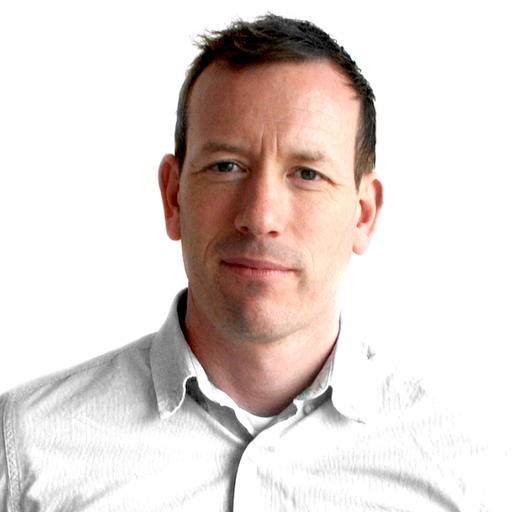
Shane McAllister
Today's Guests
